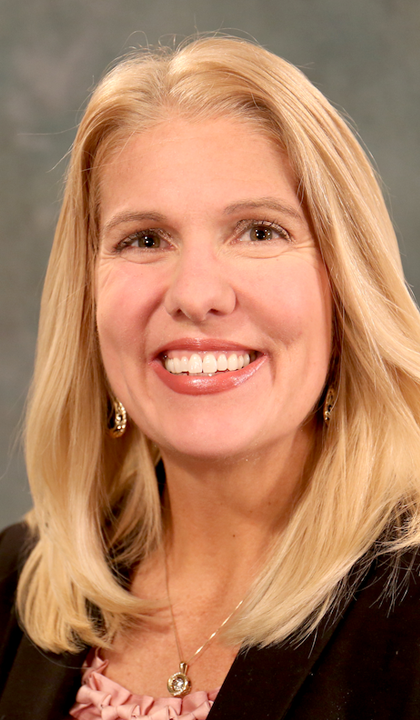Faculty Spotlight: Terri Rebmann, Ph.D., RN, CIC, FAPIC

Terri Rebmann, Ph.D., RN, CIC, FAPIC, currently serves as the Associate Dean for Academic and Faculty Affairs, Director of the Institute for Biosecurity, and a Professor of Epidemiology in the Saint Louis University College for Public Health & Social Justice. In addition to educating future health leaders, Dr. Rebmann has been on the pandemic frontline for the St. Louis community.
“Terri has been an invaluable member of our team during the COVID-19 pandemic. We are very fortunate to have her unique expertise and experience in infectious disease epidemiology, emergency preparedness and healthcare delivery.” - College of Public Health and Social Justice Dean Tom Burroughs
Dr. Rebmann currently serves on the APIC COVID-19 Task Force, whose work includes conducting a nationwide study on the availability of personal protective equipment in hospitals. The APIC COVID-19 Task Force also works closely with the CDC to help inform recommendations related to COVID-19 response. She has been assisting SLU in developing policies and procedures to minimize the spread of COVID-19 on campus and among faculty, staff, and students. In addition, she has consulted with SSM Healthcare and members of the St Louis Pandemic Task Force on issues related to the long-term use of respiratory protection among healthcare personnel. In response to the readiness and current strategy for handling coronavirus and COVID-19, Dr. Rebmann stated the following:
“I hope that US citizens, government officials, businesses, academic institutions, and response agencies learn from this tragic pandemic and recognize the need to better plan for these types of events before the next one occurs.The COVID-19 pandemic is a strong reminder that disaster preparedness is critical for everyone in public health. It is only a matter of time before the next infectious disease disaster occurs, and we all must be better prepared next time. During a pandemic, all public health professionals are involved in the response, regardless of their area of expertise or practice.”
This is not the first time Dr. Rebmann has been actively engaged in helping address infectious disease emergency readiness. Through her development of the Institute for Biosecurity, she responded during the Amerithrax bioterrorism attack in 2001, the SARS-CoV-1 outbreak in 2002/2003, MERS Co-V when it emerged in 2012, Zika, and the Ebola outbreak in 2014 - 2016. As a member of the APIC Ebola Task Force and a former member and Chair of the APIC Emergency Preparedness Committee, Dr. Rebmann served on national and international task forces and committees, focusing on reducing infection rates, preparing staff for providing patient care, and advocating for medical worker safety. These areas of focus were also incorporated in a recent webinar hosted by Dr. Rebmann with the American Nurse Association, Be Confident Protecting Yourself and Providing the Best Care to Your Patients during this COVID-19 Pandemic. She advised with the following, regarding how to handle the uncertainty of the COVID-19 pandemic and allocation of PPE for medical workers:
“It is important to remember… anytime we are using crisis standards of care, it’s not the absolute best, but it’s the best that we can do in this situation, and we used an evidence based ethical approach to decide who is going to get those limited resources.”
By practice, she is a PhD Nurse Researcher, and her past work experience includes research and clinical practice with HIV/AIDS patients and hospital infection prevention and epidemiology. One of her primary research focuses has been aimed at minimizing morbidity and mortality related to emerging infectious diseases and bioterrorism threats. Through the Association for Professionals in Infection Control and Epidemiology (APIC), she authored a book chapter in their recent publication, entitled Infectious Disease Disasters: Bioterrorism, Emerging Infections, and Pandemics. (This chapter was updated in Winter 2020, released free of charge by APIC to aid in response to COVID-19, and downloaded by over 750 individuals nationwide.) In the publication, she emphasizes the importance of readiness and the roles of Infection Preventionists:
“Infection preventionists (IPs) play a critical role in hospital/healthcare facility and community preparedness, and are responsible for becoming better prepared to effectively recognize and respond to an infectious disease disaster...It is critical for IPs to stay abreast of the ever-changing knowledge base related to infectious disease disaster preparedness and the etiological agents of concern.”
Needless to say, Dr. Rebmann is and will continue to be an essential asset in the efforts to reduce and handle the COVID-19 pandemic, for not only the St. Louis area, but also, for the epidemiology and biosecurity communities. As Dean Burroughs commented the following on Dr. Rebmann’s contributions:
“She has spent countless hours guiding the university and region on the best evidence-based actions needed to protect health and save lives. Her impact is huge. I am so grateful for everything she is doing.”
Thank you, Dr. Rebmann, for your service and contributions to our college, to the university, to the St. Louis community, and to the fields of epidemiology and biosecurity.
Please click here to view more information about Dr. Rebmann.
About the College for Public Health and Social Justice
The Saint Louis University College for Public Health and Social Justice is the only academic unit of its kind, studying social, environmental and physical influences that together determine the health and well-being of people and communities. It also is the only accredited school or college of public health among nearly 250 Catholic institutions of higher education in the United States.
Guided by a mission of social justice and focus on finding innovative and collaborative solutions for complex health problems, the College offers nationally recognized programs in public health, social work, health administration, urban planning, applied behavior analysis, criminology and criminal justice, and outcomes research and data science.